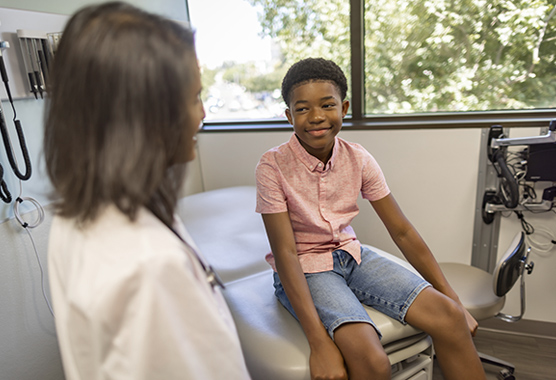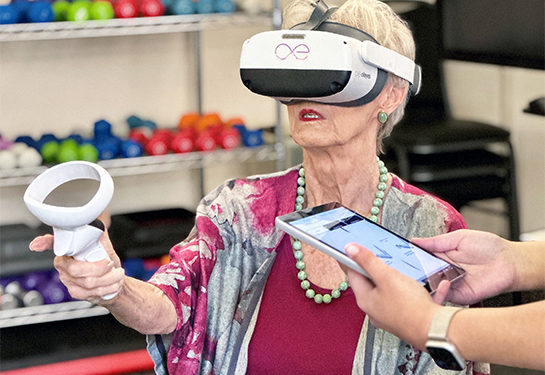Pediatric Neurology
We understand pediatric neurology conditions can be challenging for your child and family. Our child neurology department offers advanced care personalized to your child’s needs.
Medically reviewed by Courtney Wusthoff, M.D. on May 28, 2025.

Care for Your Child’s Neurologic Conditions
At UC Davis Health, you’ll get exceptional care for your child for any neurologic conditions they may experience. Our Department of Neurology works with specialty centers across UC Davis Health to bring world-class care to your child. These centers include:
- UC Davis Comprehensive Cancer Center
- UC Davis Comprehensive Epilepsy Program
- UC Davis Stroke Program
- UC Davis Deep Brain Stimulation Program
Pediatric Neurology Conditions We Treat
Pediatric neurology is the care of conditions that may affect your child’s brain, spinal cord, nerves, or muscles. These conditions have a variety of causes, ranging from a genetic basis to traumatic injury. We treat everything from common neurological conditions to rare disorders.
Seizures are one of the most common neurological disorders in children. In some cases, seizures have specific triggers. In others, repeated seizures may be a sign of epilepsy. Our team works together to diagnose the cause of seizures and help manage epilepsy.
If your child makes involuntary sounds or movements, they may be experiencing a tic disorder, such as Tourette syndrome. Your doctor can discuss the latest treatments with you, including medication and therapy.
Our specialists also treat disorders that impact the brain’s white matter, including demyelinating disorders and rarer leukodystrophies. There are more than 50 different leukodystrophies, mostly from inherited genetic changes.
Pediatric Neurology Symptoms
Symptoms of neurological conditions vary and can range from mild to severe. Discussing your child’s symptoms with their primary care physician is important. In some cases, you should take your child for immediate treatment.
Common Symptoms
Talk to your child’s physician about these symptoms when they are mild or develop slowly over time:
- Behavioral or mental changes
- Blackouts or staring spells
- Developmental difficulties
- Dizziness
- Headaches
- Muscle stiffness
- Numbness or tingling
- Tics (repetitive sound or movement)
- Tremors and other uncontrolled movements
Emergency Symptoms
You should seek medical attention right away if your child has any of these sudden changes:
- Fever, severe neck stiffness
- Sudden or new weakness
- Seizure with no prior history of seizure or epilepsy
- Severe headache or headache with other symptoms such as vomiting
- Sudden confusion, irritability, and decreased alertness
- Sudden loss of balance and coordination, and difficulty walking
- Sudden squinting that occurs with headache, vomiting, and decreased coordination
Causes of Pediatric Neurology Conditions
Sometimes neurologic disease is present at birth (congenital). But it’s also possible for a child to develop a condition as they grow up. Not every neurologic condition has a known cause. Some causes include:
Infection
Severe infections, such as bacterial meningitis and viral meningitis, affect the tissue around the brain and spinal cord.
Immune Disorders
Autoimmune disease can cause the immune system to attack the nervous system.
Injury
Traumatic injuries, such as falls, can harm the brain, nerves, and spinal cord.
Lifestyle
Malnutrition and exposure to alcohol, tobacco, drugs, and environmental toxins before or after birth can impair brain development and nervous system function.
Genetic and metabolic disorders
Abnormalities in the body’s makeup and chemical processes can affect the nervous system.
Tumors
Pressure, swelling, and the buildup of fluids from brain and spinal cord cancer and other tumors can cause neurologic symptoms.
Pediatric Neurology Diagnosis and Testing
Early diagnosis and treatment are important. For neurological disorders that require lifelong management, early intervention may alleviate the symptoms your child experiences or slow the progression of the disease.
Pediatric neurologists at UC Davis Health use advanced resources to pinpoint neurologic conditions with age-appropriate techniques to put your child at ease. Your first visit will include a physical exam. Your child’s neurologist may also request:
- Hearing and vision testing
- Blood or urine tests
- Spinal fluid testing (lumbar puncture)
- Brain imaging with a CT scan, MRI, or PET scan
- Genetic testing
- Ultrasound and X-ray
- EEG
Some children with suspected seizures may receive diagnostic evaluation through our pediatric Epilepsy Monitoring Unit. This clinic has been nationally certified for providing the highest level of epilepsy care. Children who are admitted to the Epilepsy Monitoring Unit stay in the hospital overnight for one or more nights to receive video EEG monitoring as part of their care.
Treating Nervous System Disorders in Children
When you bring your child to UC Davis, you can be assured that your child is getting treatment from one of the top neurology centers in the nation. We can see your child at our convenient locations, close to home, through video visits, and at our dedicated pediatric inpatient ward.
Your child’s treatment may include:
Lifestyle Changes
The ketogenic (“keto”) diet may help with certain conditions, such as drug-resistant epilepsy. Our dietitians can guide you to safely use this medical diet.
Medication
Your physician may prescribe medication alone or medication combined with other treatments. Medication may be oral, injectable, intravenous, or topical.
Rehabilitation and Therapy
Our behavioral, physical, occupational, respiratory, and speech pediatric rehabilitation therapy experts collaborate to help manage a variety of pediatric neurology conditions.
Surgery
Our pediatric neurosurgeons perform everything from minimally invasive procedures to complex surgeries on the brain and spinal cord. Blood vessel repair, epilepsy surgery, deep brain stimulation, and tumor removal are examples of our expertise.
Preventing Pediatric Neurological Conditions
Not all neurologic diseases are preventable. But several steps can help reduce the chance of your child developing nervous system disorders and make symptoms more manageable:
Early Intervention
Getting help from a pediatric neurologist early on can lead to better outcomes for your child.
Healthy Habits
Keep your child well-nourished and avoid exposure to alcohol, cleaning solvents, pesticides, tobacco smoke and other toxins. Teach the importance of safe play using protective gear like a bike helmet.
Professional Advice
Make an appointment or go to the emergency room if your child shows signs of neurologic symptoms or unusual behavior. Get treatment for infections.
Regular Checkups
Your child’s physician will monitor how your child meets developmental milestones.
There are
>600Neurologic diseases.
About
456KChildren ages 17 and younger have epilepsy.
Sources: National Institutes of Health: Neurologic Diseases
Centers for Disease Control and Prevention: Epilepsy Facts and Stats
Request an Appointment
As Sacramento's No. 1 hospital, you'll benefit from unique advantages in primary care and specialty care. This includes prevention, diagnosis and treatment options from experts in 150 specialties.
Referring Physicians
To refer a patient, submit an electronic referral form or call.
800-4-UCDAVIS
Patients
Call to make an appointment.
Consumer Resource Center
800-2-UCDAVIS

Ranked among the nation’s best hospitals
A U.S. News & World Report best hospital in cardiology, heart & vascular surgery, diabetes & endocrinology, ENT, geriatrics, neurology & neurosurgery, and pulmonology & lung surgery.

Ranked among the nation’s best children’s hospitals
U.S. News & World Report ranked UC Davis Children’s Hospital among the best in pediatric nephrology, orthopedics*, and pulmonology & lung surgery. (*Together with Shriners Children’s Northern California)

Ranked Sacramento’s #1 hospital
Ranked Sacramento’s #1 hospital by U.S. News, and high-performing in aortic valve surgery, back surgery (spinal fusion), COPD, colon cancer surgery, diabetes, gynecological cancer surgery, heart arrhythmia, heart failure, kidney failure, leukemia, lymphoma & myeloma, lung cancer surgery, pacemaker implantation, pneumonia, prostate cancer surgery, stroke, TAVR, cancer, orthopedics, gastroenterology & GI surgery, and urology.

The nation’s highest nursing honor
UC Davis Medical Center has received Magnet® recognition, the nation’s highest honor for nursing excellence.

World-class cancer care
One of ~59 U.S. cancer centers designated “comprehensive” by the National Cancer Institute.

A leader in health care equality
For the 13th consecutive year, UC Davis Medical Center has been recognized as an LGBTQ+ Healthcare Equality Leader by the educational arm of America’s largest civil rights organization.

